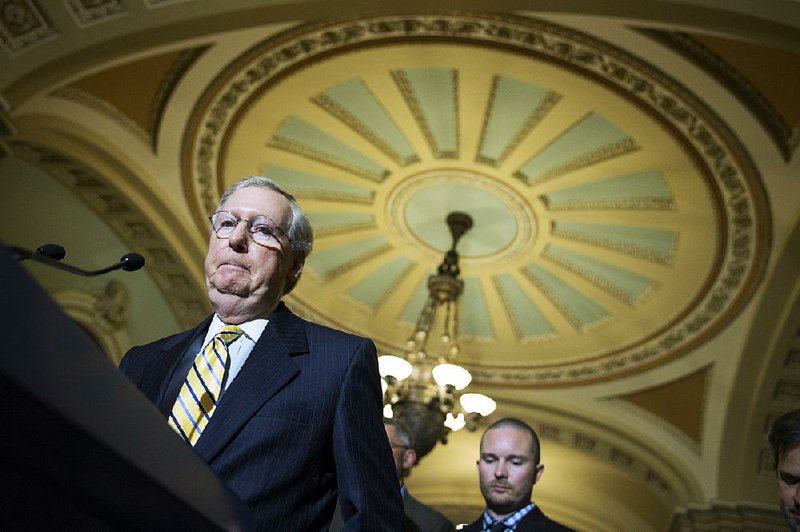WASHINGTON -- President Barack Obama's administration and Senate Republicans worked Tuesday to advance trade legislation opposed by many Democrats.
The administration threatened to veto a proposed change in the trade bill to require U.S. negotiators to target currency manipulation more directly in trade talks, and Senate Republican leader Mitch McConnell said the GOP was prepared to vote down the amendment.
"We'll be working hard to keep any amendment off the bill that could tank" it, he said.
McConnell, R-Ky., is one of Obama's fiercest critics in Congress, and his comment underscored the unusual political lines created by the bill.
The measure would let the president negotiate global trade deals that Congress could approve or reject but not change. The White House and pro-business Republicans support the measure, while union-backed Democrats oppose it.
Sen. Rob Portman, R-Ohio, who once served as President George W. Bush's special trade representative, is also a likely supporter of the bill. At the same time, he faces a competitive re-election campaign in his Midwestern political swing state next year and has played a central role in efforts to make the legislation require American negotiators to give higher importance to fighting currency manipulation by other countries.
The division has spilled over into the 2016 race for the White House, as well. Former Secretary of State Hillary Rodham Clinton, whose husband negotiated the North American Free Trade Agreement when he sat in the White House, refused Tuesday to say whether she favored or opposed the legislation to give Obama the authority to conclude similar deals.
"I want to judge the final agreement," she said as she campaigned in Iowa, adding that her concerns include any deal's effects on jobs, wages and economic expansion in the United States.
Her statement mirrors the apprehensions of many Democrats in Congress, who complain that they are being asked to trust Obama to conclude a trade deal they haven't seen and wouldn't be able to change once they do.
The administration's veto threat came in the form of a letter from Treasury Secretary Jacob Lew to the bill's leading supporters. He warned that approving the amendment backed by Portman, Sen. Debbie Stabenow, D-Mich., and others could cause trade partners to walk away from talks on a 12-nation deal among countries that border the Pacific Ocean "and cause us to lose ground on holding countries accountable on currency."
Lew also warned it could "give our trading partners the power to challenge legitimate U.S. monetary policies needed to ensure strong employment and a healthy robust economy, an outcome we would find unacceptable."
The drive to give currency manipulation a more central role in trade talks is caused chiefly by concerns about Japan, which is part of the current round of negotiations. There are also constant concerns about China, which is not.
In his letter, Lew said the United States has worked hard to combat alleged currency manipulation by both nations in recent years.
"China's currency has appreciated by nearly 30 percent since 2010 and Japan has not intervened in the foreign exchange market in more than three years," he wrote.
Stabenow, in remarks on the Senate floor, said that when governments intervene in the marketplace to manipulate the value of their currency, it "is cheating, plain and simple. It means that foreign products are cheaper here, and U.S. products are more expensive there."
McConnell has said repeatedly that he intends to have the Senate complete work on the trade bill by week's end, when lawmakers are due to begin a Memorial Day vacation.
The bill appears to have more than 60 votes in its favor, including most Republicans and a dozen or so Democrats. But Sen. Maria Cantwell, D-Wash., and other Democratic backers of the bill also are attempting to use it as leverage to assure that authorization for the Export-Import Bank doesn't expire at the end of June.
That added yet another layer of complexity to the debate on the issue, since several conservatives in both houses want to put the Export-Import Bank out of business. They say it gives the government too big a role in helping some large American companies sell products overseas at the expense of others.
McConnell said supporters of the agency deserve a vote on the issue but that such a vote should be separate from the trade bill vote.
As the vote approached, Secretary of State John Kerry urged support for the measure in a speech at a Boeing plant in Renton, Wash. Without a deal, he said, "standards will be driven down, not up, and America's competitors will get more business at the expense of domestic U.S. businesses."
Information for this article was contributed by Jim Kuhnhenn, Julie Pace and Matthew Lee of The Associated Press.
A Section on 05/20/2015
